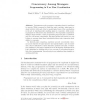Free Online Productivity Tools
i2Speak
i2Symbol
i2OCR
iTex2Img
iWeb2Print
iWeb2Shot
i2Type
iPdf2Split
iPdf2Merge
i2Bopomofo
i2Arabic
i2Style
i2Image
i2PDF
iLatex2Rtf
Sci2ools
113
click to vote
TGC
2005
Springer
2005
Springer
Concurrency Among Strangers
Programmers write programs, expressing plans for machines to execute. When composed so that they may cooperate, plans may instead interfere with each other in unanticipated ways. Plan coordination is the art of simultaneously enabling plans to cooperate, while avoiding hazards of destructive plan interference. For sequential computation within a single machine, object programming supports plan coordination well. For concurrent computation, this paper shows how hard it is to use locking to prevent plans from interfering without also destroying their ability to cooperate. In Internet-scale computing, machines proceed concurrently, interact across barriers of large latencies and partial failure, and encounter each other’s misbehavior. Each dimension presents new plan coordination challenges. This paper explains how the E language addresses these joint challenges by changing only a few concepts of conventional sequential object programming. Several projects are adapting these insights to...
Related Content
| Added | 28 Jun 2010 |
| Updated | 28 Jun 2010 |
| Type | Conference |
| Year | 2005 |
| Where | TGC |
| Authors | Mark S. Miller, Eric Dean Tribble, Jonathan S. Shapiro |
Comments (0)

